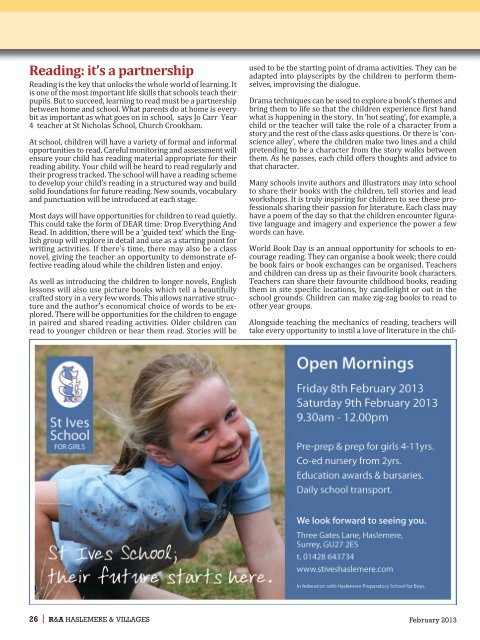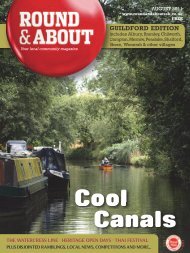View as a PDF - Round & About Magazine
View as a PDF - Round & About Magazine
View as a PDF - Round & About Magazine
Create successful ePaper yourself
Turn your PDF publications into a flip-book with our unique Google optimized e-Paper software.
Reading: it’s a partnership<br />
Reading is the key that unlocks the whole world of learning. It<br />
is one of the most important life skills that schools teach their<br />
pupils. But to succeed, learning to read must be a partnership<br />
between home and school. What parents do at home is every<br />
bit <strong>as</strong> important <strong>as</strong> what goes on in school, says Jo Carr Year<br />
4 teacher at St Nichol<strong>as</strong> School, Church Crookham.<br />
At school, children will have a variety of formal and informal<br />
opportunities to read. Careful monitoring and <strong>as</strong>sessment will<br />
ensure your child h<strong>as</strong> reading material appropriate for their<br />
reading ability. Your child will be heard to read regularly and<br />
their progress tracked. The school will have a reading scheme<br />
to develop your child’s reading in a structured way and build<br />
solid foundations for future reading. New sounds, vocabulary<br />
and punctuation will be introduced at each stage.<br />
Most days will have opportunities for children to read quietly.<br />
This could take the form of DEAR time: Drop Everything And<br />
Read. In addition, there will be a ‘guided text’ which the English<br />
group will explore in detail and use <strong>as</strong> a starting point for<br />
writing activities. If there’s time, there may also be a cl<strong>as</strong>s<br />
novel, giving the teacher an opportunity to demonstrate effective<br />
reading aloud while the children listen and enjoy.<br />
As well <strong>as</strong> introducing the children to longer novels, English<br />
lessons will also use picture books which tell a beautifully<br />
crafted story in a very few words. This allows narrative structure<br />
and the author’s economical choice of words to be explored.<br />
There will be opportunities for the children to engage<br />
in paired and shared reading activities. Older children can<br />
read to younger children or hear them read. Stories will be<br />
used to be the starting point of drama activities. They can be<br />
adapted into playscripts by the children to perform themselves,<br />
improvising the dialogue.<br />
Drama techniques can be used to explore a book’s themes and<br />
bring them to life so that the children experience first hand<br />
what is happening in the story. In ‘hot seating’, for example, a<br />
child or the teacher will take the role of a character from a<br />
story and the rest of the cl<strong>as</strong>s <strong>as</strong>ks questions. Or there is ‘conscience<br />
alley’, where the children make two lines and a child<br />
pretending to be a character from the story walks between<br />
them. As he p<strong>as</strong>ses, each child offers thoughts and advice to<br />
that character.<br />
Many schools invite authors and illustrators may into school<br />
to share their books with the children, tell stories and lead<br />
workshops. It is truly inspiring for children to see these professionals<br />
sharing their p<strong>as</strong>sion for literature. Each cl<strong>as</strong>s may<br />
have a poem of the day so that the children encounter figurative<br />
language and imagery and experience the power a few<br />
words can have.<br />
World Book Day is an annual opportunity for schools to encourage<br />
reading. They can organise a book week; there could<br />
be book fairs or book exchanges can be organised. Teachers<br />
and children can dress up <strong>as</strong> their favourite book characters.<br />
Teachers can share their favourite childhood books, reading<br />
them in site specific locations, by candlelight or out in the<br />
school grounds. Children can make zig-zag books to read to<br />
other year groups.<br />
Alongside teaching the mechanics of reading, teachers will<br />
take every opportunity to instil a love of literature in the chil-<br />
26 x R&A HASLEMERE & VILLAGES February 2013







